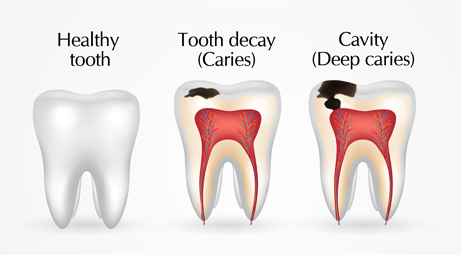
What is tooth decay?
When your teeth are covered with a biofilm layer called plaque, it tends to decay. Plaque is composed of oral bacteria and carbohydrates from food. Those bacterias in plaque starts to produce acids in presence of carbohydrates if present in the tooth for a longer period of time. Those acids then demineralizes the tooth causing a tooth cavity (tooth decay).
If these cavities or holes are left untreated for a longer period of time, it may eventually damage the whole tooth causing loss of tooth.
Why your tooth decays?
There are number of reasons for why your tooth decays. Starting from loss of tooth surface by demineralization due to the nature and frequency of sugary food you take to your oral hygiene habits etc. Here we elaborate as:
Plaque formation: Plaque (oral microorganisms + carbohydrates) when adheres into the tooth surface for longer period of time, the bacteria in it starts to produce acids causing tooth to demineralize.
Bacteria + Carbohydrate—–time—-produce ACID—— demineralize tooth
Factors that retain plaque in tooth surface for longer period of time:
- Poor oral hygiene : improper brushing and flossing habit, habit of not rinsing your mouth after every meal, not use of other oral hygiene aids like interdental brush etc.
- Dry mouth: saliva in the mouth helps to wash away the plaque. Plaque may retain in the tooth for a longer period of time in people having less amount of saliva. This dryness of mouth is called xerostomia.
- Food and beverages: people with the habit of taking sugary food and drinks frequently are at high risk of having dental decay.
- Presence of irregular teeth: Even if you have proper teeth cleaning habits, if you have irregular teeth, then all the food particles and plaque between your teeth will not be removed completely causing your tooth to decay.
- Medical problems: Medical conditions such as acidic regurgitation , frequent vomiting, certain drugs causing xerostomia, or radiation to head and neck regions for treatment of some cancers.
Stages of tooth decay:
STAGE 1: First stage of tooth decay, where only the outermost layer of the tooth called enamel is involved. Seen as black spots on tooth surfaces without any symptoms. Can be remineralized by proper brushing , flossing and other oral hygiene aids. Does not require any dental treatment.
STAGE 2: Second stage of tooth decay where enamel along with the inner layer of the tooth i.e. dentin is involved. Symptoms such as sensitivity to hot and cold are seen. Can be treated by simple dental restorative materials such as composites, Glass Ionomer Cements (GIC).
STAGE 3: Third Stage of tooth decay, where the innermost layer of tooth called pulp is involved where the blood n nerve supplies are present. Hence starts having pain on having foods. Treatment involves removal of infected pulp which is replaced by artificial pulp called Root Canal Treatment (RCT). This treatment is a little expensive and time consuming.
STAGE 4: Late stage which occurs when the dental tooth decay involving the pulp is not treated, it tends to spread along the bony tissues around the tooth. Symptoms such as pain , swelling and abscess with or without pus discharge is seen. Treatment involves RCT along with management of abscess and swellings.
Preventions:
- Toothbrush and toothpaste: While choosing a toothbrush, always make sure that your toothbrushes can reach all the tooth surfaces. Toothpaste with Fluoride is recommended as fluoride can make your teeth stronger that can prevent decay. Also, brushing your teeth at least twice a daily with these toothbrushes and toothpaste is advised.
- Flossing, oral rinsing habit after every meal and use of mouthwash.
- Minimal intake of sugary and sticky food that can retain in tooth surfaces for a longer period of time.
- Fluoride application and pits and fissure sealants
- Visit your dentist regularly every 6 months for early detection of dental problems and proper counselling.




